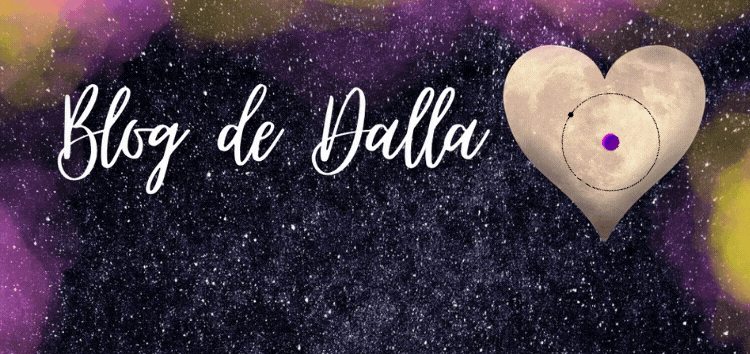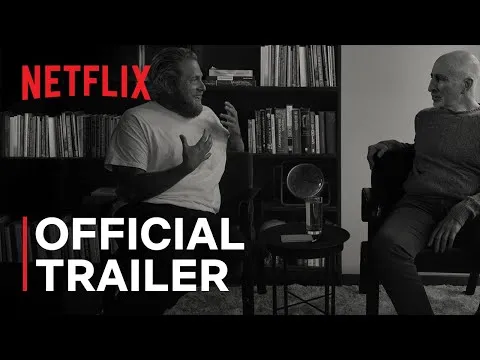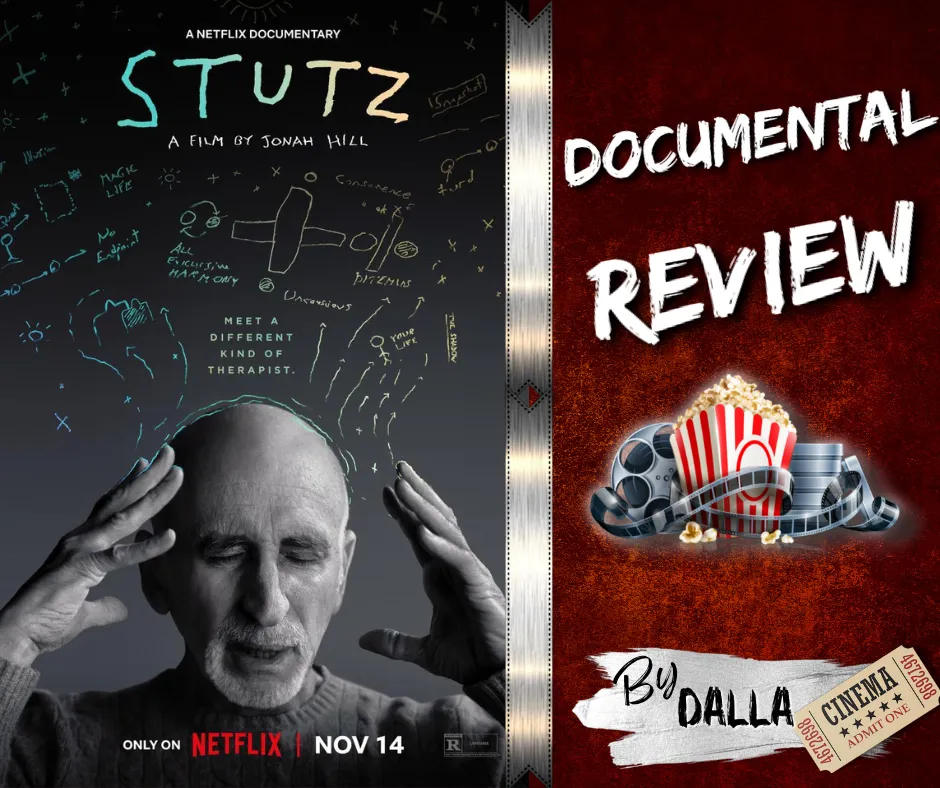

¡Saludos queridos espectadores de cine! El fin de semana me encontré con este documental en Netflix y al leer la sinopsis me sentí enganchada, así que me dispuse a verlo y me encontré con una grata sorpresa que vengo a contarles.
Greetings dear moviegoers! Over the weekend I came across this documentary on Netflix and upon reading the synopsis I was hooked, so I set out to watch it and found myself with a pleasant surprise that I come to tell you about.

El actor Johan Hill tiene bastantes años de su vida yendo a psicoterapias con el prestigioso Psiquiatra Phil Stutz, han desarrollado una amistad muy cercana porque lo ha ayudado en los momentos más difíciles de su vida. Debido a esto quiere dedicarle un documental dirigido a dar a conocer la estrategia que usó el Dr. Stutz con él y que lo ayudó a salir de una de las más grandes Depresiones de su vida, para ayudar a la mayor cantidad de personas posibles enviando el mensaje a través de los medios audiovisuales.
The actor Johan Hill has many years of his life going to psychotherapies with the prestigious Psychiatrist Phil Stutz, they have developed a very close friendship because he has helped him in the most difficult moments of his life. Because of this he wants to dedicate a documentary directed to make known the strategy that Dr. Stutz used with him and that helped him to get out of one of the biggest Depressions of his life, to help as many people as possible sending the message through audiovisual media.

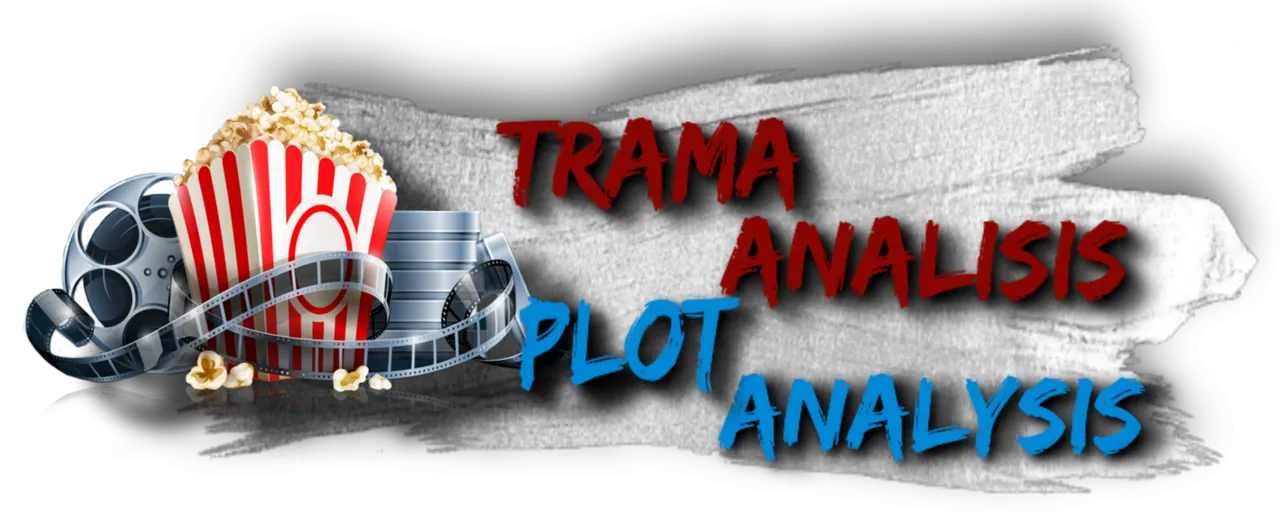
La verdad tenía tiempo sin ver un formato audiovisual de este tipo, así que me dejó una muy grata impresión, probablemente para muchos pueda ser algo común de ver, pero para mí no lo fue, solo les advierto, por lo que mi perspectiva puede estar algo sesgada debido a esto y a que el tema evidentemente es de mi agrado.
Aclaro que este análisis tendrá mucho spoiler, pero ¡vamos! Lo importante aquí es aprender "El Método" que te ofrece el Doctor para solventar tus dificultades, lo que yo diga aquí va a ser ínfimo con respecto a todo lo que hay en la producción, solo recalcaré lo que me pareció importante porque el documental así lo amerita y quiero que quede en mi blog de Psicoayuda.
Voy a empezar hablándoles de que, realmente fue impresionante para mí aprender la técnica tan única que usa este Médico Especialista en Psiquiatría mientras iba conociendo parte de la vida de Johan y por todo lo que ha tenido que pasar desde que era muy joven y que, muchos no conocen porque probablemente al igual que yo lo conocimos en un principio por películas de comedia, pero realmente hay un pasado complejo en Johan lo cual lo marcó profundamente y es la razón del por qué decidió hacer este documental como una especie de agradecimiento a su Doctor.
Evidentemente conocer ese pasado de Johan y por lo que tuvo que pasar es muy importante en todo el documental, pero él recalca todo el tiempo que el documental es hecho por él para hablar de su doctor, no de él. Es como una especie de psicoterapia que le hace un paciente a un médico ¿bizarro, cierto? Por eso es tan atrayente y por eso, lo mejor, para mí, es que nos permitió conocer también la humanidad y la vida del Doctor.
The truth was a long time without seeing an audiovisual format of this type, so it left me a very pleasant impression, probably for many it may be something common to see, but for me it was not, I just warn you, so my perspective may be somewhat biased because of this and that the subject is obviously to my liking.
I will clarify that this analysis will have a lot of spoilers, but come on! The important thing here is to learn "The Method" that the Doctor offers you to solve your difficulties, what I say here is going to be insignificant with respect to everything that is in the production, I will only emphasize what I thought was important because the documentary deserves it and I want it to remain in my Psychohelp blog.
I will start by telling you that it was really impressive for me to learn the unique technique used by this Physician Specialist in Psychiatry while I was getting to know part of Johan's life and everything he has had to go through since he was very young and that many do not know because probably like me we knew him at first by comedy movies, but there really is a complex past in Johan which marked him deeply and that is the reason why he decided to make this documentary as a kind of thanks to his Doctor.
Obviously knowing Johan's past and what he had to go through is very important in the whole documentary, but he emphasizes all the time that the documentary is made by him to talk about his doctor, not about him. It's like a kind of psychotherapy that a patient does to a doctor, bizarre, isn't it? That's why it is so attractive and that's why, for me, the best thing is that it also allows us to get to know the Doctor's humanity and life.

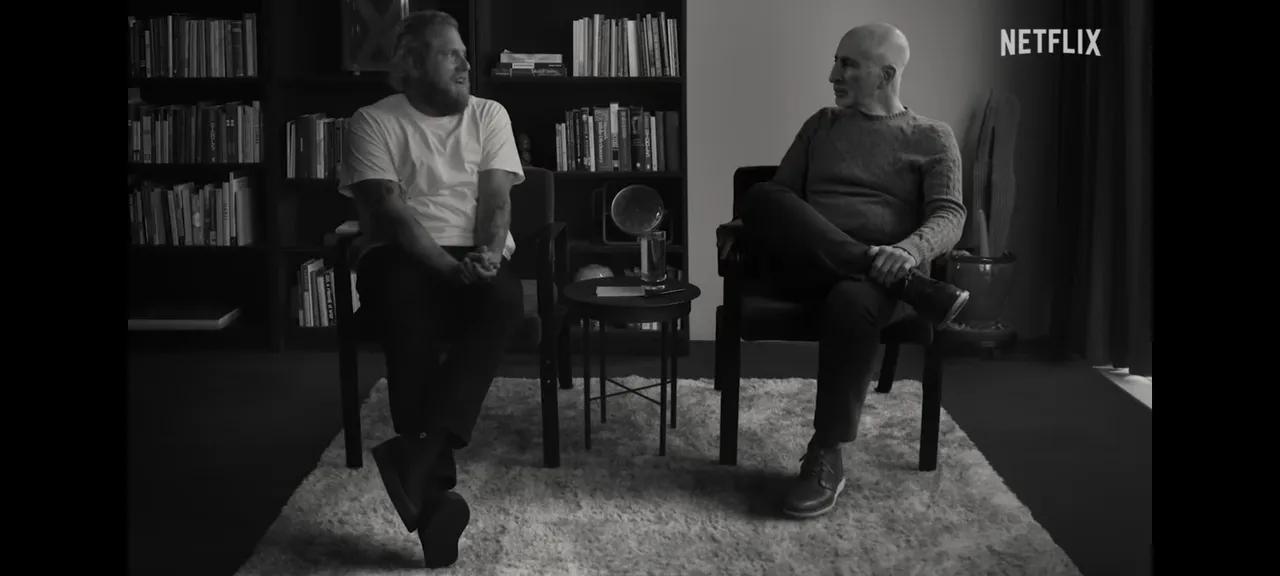

Por supuesto dudo que la mayoría de los que vean el documental vayan a enfocarse en esa parte, todo el trabajo es muy muy educativo psicológicamente para cualquier persona que esté pasando por un proceso difícil o que tenga una Enfermedad Mental, lo cual se agradece demasiado y admiré muchísimo.
Pero, dejando un poco de lado eso que probablemente vayas a leer en todos lados donde dan su opinión del documental y del método que usa el Dr., lo que más me gustó fue que Johan quiso que conociéramos también la sensibilidad del su doctor, que también es su amigo y lo quiere.
Obviamente mi visión está sesgada, como podrán ver, porque soy médico, pero es que si ven el documental como un todo y no solo tratando de aprender la técnica que ofrece el Doctor, comprenderán que él usó todas sus herramientas en sí mismo para llegar a ser lo que es y el método que desarrolló (que es tan bueno demostrándolo y llevándolo a cabo con miles de pacientes) es tan bueno y confía tanto en él, porque ya lo puso en práctica consigo mismo desde que era muy muy joven, al haber pasado por una situación verdaderamente difícil donde la vida lo obligó a aprender lo que sabe hoy en día y perfeccionarlo con su educación.
Por supuesto ya a los 74 años de edad que tiene, es un experto en él si lo viene practicando desde pequeño en sí mismo, replicando en miles de personas y obteniendo resultados positivos; pero aun sabiendo todo lo que sabe a la perfección y habiendo ayudado a tantas personas, él reconoce que hay temas que son difíciles de hablar para él, que hubieron procesos en su infancia que lo marcaron durante toda su vida a partir de un hecho en específico y otros factores que coexistieron, e incluso, causaron mella en su personalidad de forma permanente por lo que aún trabaja cada día para luchar contra su propia sombra.
Por eso me impactó, me pareció muy humilde de su parte mostrarse tan transparente ante millones de personas y aceptar que la vulnerabilidad es lo que nos hace ser grandes, que ninguna persona puede llegar a amar a otro sin dejarse ser frágil y que la mejor forma de ayudar psicológicamente a otro es mostrándolo. Esta es una cualidad que, por experiencia, (y me disculpan mis colegas especialistas en el área) he notado que pocos Psiquiatras tienen.
Of course I doubt that most of those who watch the documentary are going to focus on that part, all the work is very very educational psychologically for anyone who is going through a difficult process or who has a Mental Illness, which is very much appreciated and I admired very much.
But, leaving a little aside that which you are probably going to read everywhere where they give their opinion of the documentary and the method that the Dr. uses, what I liked the most was that Johan wanted us to know also the sensibility of his doctor, who is also his friend and loves him.
Obviously my vision is biased, as you can see, because I am a doctor, but if you see the documentary as a whole and not only trying to learn the technique that the Doctor offers, you will understand that he used all his tools on himself to become what he is and the method he developed (which is so good demonstrating it and carrying it out with thousands of patients) is so good and he trusts it so much, because he already put it into practice with himself since he was very very young, having gone through a really difficult situation where life forced him to learn what he knows today and to perfect it with his education.
Of course, at 74 years of age, he is an expert in it if he has been practicing it since he was a child in himself, replicating it in thousands of people and obtaining positive results; but even knowing everything he knows perfectly and having helped so many people, he recognizes that there are issues that are difficult for him to talk about, that there were processes in his childhood that marked him throughout his life from a specific event and other factors that coexisted, and even caused a permanent dent in his personality, so he still works every day to fight against his own shadow.
That is why I was shocked, I found it very humble of him to be so transparent before millions of people and to accept that vulnerability is what makes us great, that no person can love another without letting himself be fragile and that the best way to help another psychologically is to show it. This is a quality that, from experience, (and excuse me my colleagues who are specialists in the area) I have noticed that few Psychiatrists have.

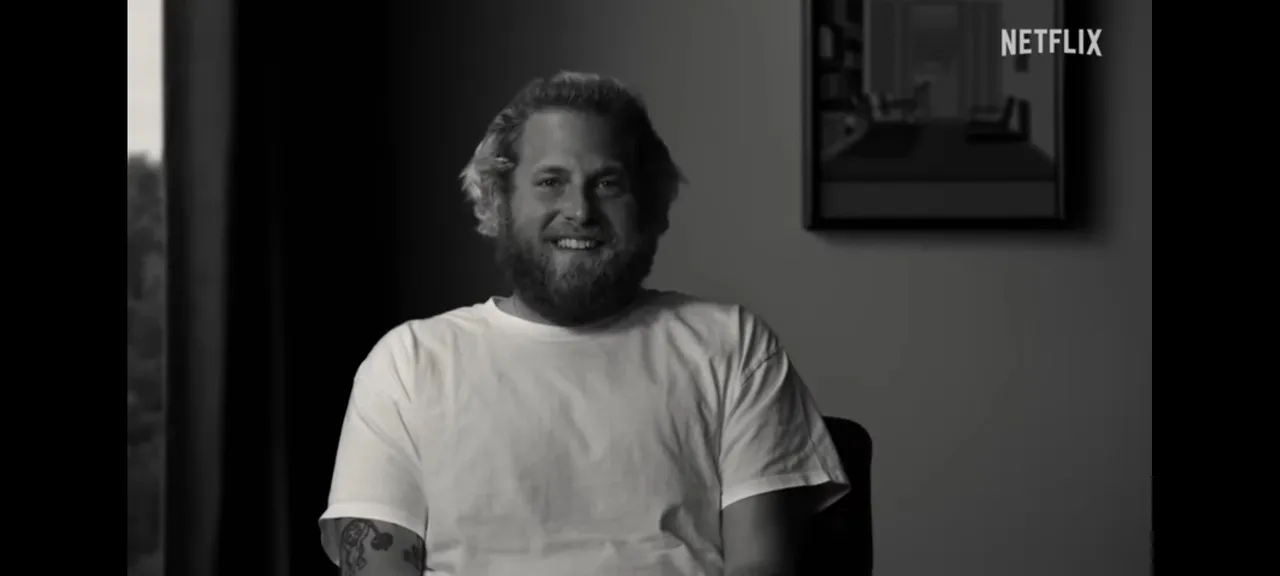

De hecho, una de las razones por las cuales descarté hacer esa especialidad en mi vida fue por eso, porque no quería ser tan distante y frío con mis pacientes, no iba a poder ser yo, iba a tener que desarrollar un alter ego de mí en las consultas y no iba a poder vivir toda mi vida de esa forma. Yo soy ¡yo! en todas las facetas de mi vida, es la misma Dalla en todos lados, pero la mayoría de los especialistas en esa área sí lo hacen, desarrollan ese mecanismo de defensa bastante claro de separación entre lo profesional y lo personal, lo cual está bien, lo respeto, es una forma de proteger su psique.
El Doctor es enfático al recalcar algo en todo el documental, y es algo que también noto y me parece un poco ortodoxo. Muchos psicoterapeutas, psicólogos y psiquiatras solo escuchan al paciente y les dan herramientas para que ellos resuelvan sus problemas, pero justamente eso de "solo escuchar" es lo que hace que muchos pacientes no vuelvan a las terapias y se sientan desesperanzados al no conseguir la ayuda que esperaban.
Por eso, él hace énfasis en que hay que ofrecer las herramientas y escuchar ¡claro que sí! Pero debemos empezar por lo fundamental, que es cuidar nuestra salud física, porque a fin de cuentas hay que preservar la vida del paciente, y al él notar mejoría instantánea en su vida con este primer paso, entonces se sentirá nuevamente esperanzado y seguirá asistiendo para poder escalar en la pirámide de sanación mental.
Recalca también algo que es súper necesario repetir todo el tiempo, que las dificultades son las que nos hacen crecer, que la vergüenza y la humillación no es algo malo, al contrario, es lo que nos hace conectar con otros con el mismo nivel de sensibilidad y que terminarán siendo esas personas que no queremos apartar de nuestra vida, las que nos marcan para siempre, porque nos ayudaron en momentos difíciles, nos salvaron de nosotros mismos y del mundo, la mayoría conoce ahí a sus verdaderos amigos ¿cierto?
Nos dice en todo momento que veamos una adversidad como un momento para crecer, que las dificultades siempre se van a presentar, pero que cuando aparecen debemos recordar que en la vida todo pasa por algo, que es una oportunidad de madurar, de evolucionar y de esa forma aminoramos el tiempo del dolor y el sufrimiento. Nos aclara que el dolor nunca podremos dejar de sentirlo, es una parte importante de nuestra humanidad, él siempre seguirá ahí, solo debemos aprender a lidiar con él cuando aparezca.
In fact, one of the reasons why I discarded that specialty in my life was because of that, because I did not want to be so distant and cold with my patients, I was not going to be able to be me, I was going to have to develop an alter ego of me in the consultations and I was not going to be able to live my whole life that way. I am me! in all facets of my life, it is the same Dalla everywhere, but most of the specialists in this area do, they develop a very clear defense mechanism of separation between the professional and the personal, which is fine, I respect it, it is a way of protecting their psyche.
The Doctor is emphatic in emphasizing something throughout the documentary, and it is something that I also notice and it seems a bit orthodox to me. Many psychotherapists, psychologists and psychiatrists only listen to the patient and give them tools for them to solve their problems, but it is precisely this "only listening" that makes many patients not return to therapy and feel hopeless because they do not get the help they expected.
That is why he emphasizes that we must offer the tools and listen, of course we must! But we must start with the fundamentals, which is to take care of our physical health, because at the end of the day we have to preserve the patient's life, and when he notices instant improvement in his life with this first step, then he will feel hopeful again and will continue to attend in order to climb the pyramid of mental healing.
He also emphasizes something that is super necessary to repeat all the time, that the difficulties are what make us grow, that shame and humiliation is not a bad thing, on the contrary, is what makes us connect with others with the same level of sensitivity and end up being those people we do not want to remove from our lives, those who mark us forever, because they helped us in difficult times, saved us from ourselves and the world, most know their true friends there, right?
He tells us at all times to see adversity as a moment to grow, that difficulties will always arise, but that when they appear we must remember that in life everything happens for a reason, that it is an opportunity to mature, to evolve and in this way we reduce the time of pain and suffering. He clarifies that we can never stop feeling pain, it is an important part of our humanity, it will always be there, we just have to learn to deal with it when it appears.

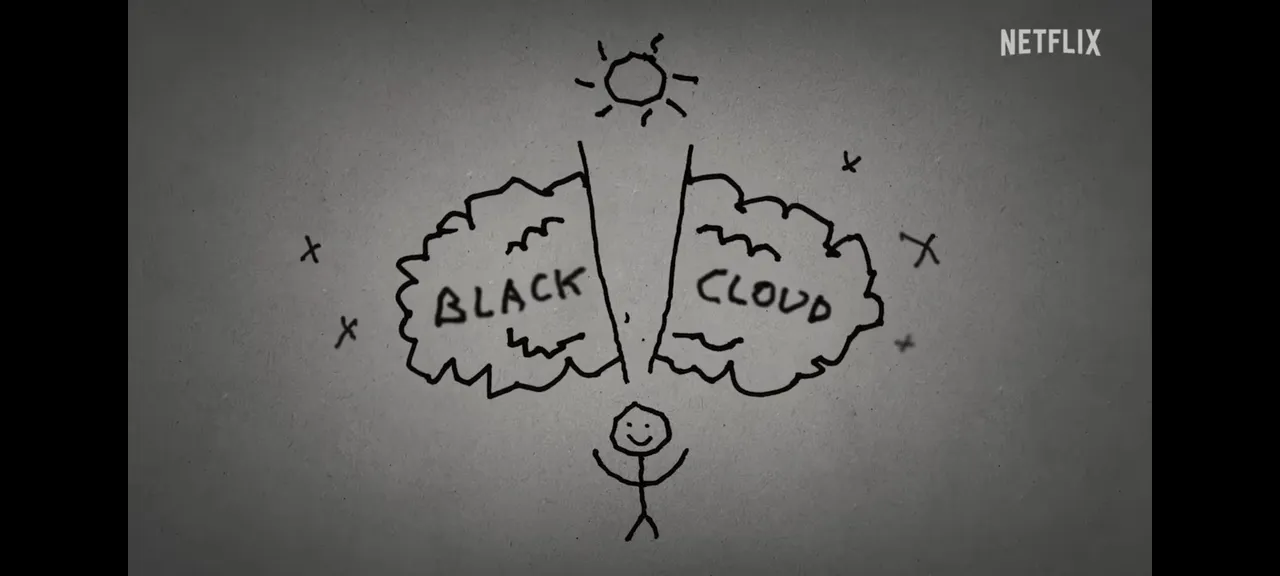

Nos hacen entender que ese laberinto en la que entramos cuando queremos que nos compensen por el daño que nos han causado otros en el pasado, solo prolonga nuestro propio sufrimiento, porque quedamos anclados en ese momento y que ese dolor es uno de los principales causantes de las Enfermedades Mentales, así que hay que salir de ese laberinto, es uno de los pasos fundamentales para sanar.
Que la única forma de superar el dolor es con amor propio, e igual no lo eliminaras completamente de tu vida, siempre deberás luchar contra él, así como contra la incertidumbre y mantener un trabajo constante para poder mantener todo al margen, evitando que las cosas te afecten demasiado.
Finalmente nos habla de nuestras sombras, de esa parte de ti que te avergüenza, que no quieres que nadie vea y que, probablemente, fue el origen de todos los problemas emocionales o incluso de tu forma de reaccionar a inconvenientes en tu día a día, de cómo debemos entablar una relación sana con ella, que debemos atenderla porque ella nunca se irá forma parte de nosotros, pero también podemos mantenerla al margen para que no nos afecte tanto.
Hay demasiadas cosas importantes en todo el documental amigos, esto que les digo son cosas que probablemente hayas leído en otros lados, es cierto, pero la forma como lo plantea el Dr. Stutz hace que todo sea fácilmente digerible y comprensible. Es tan práctico en su método, que incluso hace gráficos que los pacientes se llevan a sus casas, y esos gráficos los acompañan en momentos difíciles y los ayudan a enfocarse al recordar todo lo que aprendieron en sus terapias.
Por todo esto que les acabo de decir y más ¡créanme! ustedes ¡Necesitan ver este documental! No importa si no tienes una enfermedad mental, es que te ayudará a ampliar tu perspectiva de todas las dificultades de la vida. El Dr. Stutz es un afamado Psiquiatra de muchas personalidades importantes en Hollywood y en todo EEUU, ha escrito algunos libros y colaborado en otros, este documental, se basa en su libro "El Método", que ya estoy buscando para leer y aprender más.
They make us understand that the labyrinth in which we enter when we want to be compensated for the damage that others have caused us in the past, only prolongs our own suffering, because we remain anchored in that moment and that this pain is one of the main causes of Mental Illness, so you have to get out of that labyrinth, it is one of the fundamental steps to heal.
That the only way to overcome pain is with self-love, and even though you will not eliminate it completely from your life, you will always have to fight against it, as well as against uncertainty and maintain a constant work to be able to keep everything aside, avoiding that things affect you too much.
Finally it tells us about our shadows, about that part of you that embarrasses you, that you don't want anyone to see and that probably was the origin of all the emotional problems or even the way you react to inconveniences in your day to day life, about how we should establish a healthy relationship with it, that we should take care of it because it will never leave, it is part of us, but we can also keep it aside so that it doesn't affect us so much.
There are too many important things in the whole documentary friends, this I tell you are things that you have probably read elsewhere, it is true, but the way Dr. Stutz puts it makes everything easily digestible and understandable. He is so practical in his method, that he even makes graphs that patients take home, and those graphs accompany them in difficult moments and help them focus by remembering everything they learned in their therapies.
Because of all this and more, believe me, you need to see this documentary! It doesn't matter if you don't have a mental illness, it will help you broaden your perspective on all of life's difficulties. Dr. Stutz is a famed Psychiatrist to many important personalities in Hollywood and all over the USA, he has written some books and collaborated in others, this documentary, is based on his book "The Method", which I am already looking forward to read and learn more.

Realmente la parte técnica de cómo se llevó a cabo el documental, que no es mucha porque realmente es un conversatorio entre 2 personas en lo que parece ser el consultorio del Dr., el director (que es el mismo Johan Hill) logra hacer un trabajo en la escenografía que hace ver el documental profundamente intimista, al estar solo en esas 4 paredes ambos hablando de las dificultades de la vida, te hace sencillamente sentir que formas parte de esa conversación y que es como si tu estuvieras recibiendo la terapia personalizada de parte del mismo Doctor.
Las tonalidades de toda la producción son en blanco y negro, lo que hace que tu sensibilidad aflore, los tonos de grises imprimen algo de tristeza ¿cierto? No sé expresar con exactitud que sentía, lo que sí sé es que pude empatizar más fácilmente por las 2 personas, porque los colores hacen que veas que están hablando de las partes más oscuras de su vida.
Todo esto mientras en la pantalla van apareciendo los gráficos explicativos del Dr. en tonos blanco, como dando una impresión de luz en toda esa oscuridad. Lo mejor de todo es que esos gráficos tan únicos, están hechos con la misma letra del Dr., quien tiene Enfermedad de Parkinson y denota, además de sus conocimientos y sus ganas de ayudar, su fragilidad al estar condenado a una enfermedad degenerativa incurable y que queda marcada en esos trazos irregulares y que con tanta dificultad realiza para ayudar a los demás.
Relación Médico Paciente: me encantó como mostraron todo esto, y la forma tan diferente que la lleva a cabo el Dr., y es que en serio la forma como debemos llevar esa relación, que nos muestran en la escuela de medicina cuando buscamos ayudar a personas con enfermedades mentales a mi parecer es completamente poco práctica, por eso me proyecté tanto en la forma como actúa el Dr., eso de mantener una distancia impenetrable con el paciente donde solo obtengas respuestas a las preguntas que debes hacer y que él sea el que consiga respuestas a todos sus problemas, no la comparto.
Este Doctor, hace lo que yo, convierte a sus pacientes en sus amigos, les hace bromas pesadas para aligerar el ambiente, tal vez no actúa con todos como con Johan porque abiertamente dice que lo ama como un amigo, pero por lo que se muestra en el documental él siempre actúa así y eso me hizo entender que el Dr. realmente intenta dar lo mejor de sí con cada paciente para que sientan la confianza de contarles sus oscuridades.
La humanización de quien realiza la Psicoterapia, Como ven realmente me enfoqué en esto porque para mí es un detalle muy importante de recalcar cuando mando a mis pacientes a Psicoterapia con mis colegas Psiquiatras, o con Psicólogos. Siempre les recalco que, si no les fue bien con uno, busquen otro, porque es importante que den con uno con el que puedan desarrollar una relación armoniosa, uno con el que se sientan cómodos, que no se sientan juzgados, que no sean rígidos, que se sientan comprendidos, no es fácil encontrarlos, lo sé, pero sí los hay y este Doctor es una demostración de cómo deben serlo.
- Actually the technical part of how the documentary was carried out, which is not much because it is really a conversation between 2 people in what seems to be the doctor's office, the director (who is Johan Hill himself) manages to do a job in the scenography that makes the documentary look deeply intimate, being alone in those 4 walls both talking about the difficulties of life, makes you simply feel that you are part of that conversation and it is as if you were receiving personalized therapy from the doctor himself.
- The tonalities of the whole production are in black and white, which makes your sensibility come to the surface, the shades of gray print some sadness, right? I don't know how to express exactly what I felt, what I do know is that I could empathize more easily for the 2 people, because the colors make you see that they are talking about the darkest parts of their lives.
- All this while on the screen are appearing the Dr.'s explanatory graphics in white tones, as giving an impression of light in all that darkness. The best of all is that these unique graphics are made with the same handwriting of Dr., who has Parkinson's disease and denotes, in addition to his knowledge and his desire to help, his fragility to be condemned to an incurable degenerative disease and that is marked in those irregular strokes and with such difficulty to help others.
- Physician-Patient Relationship:I loved how they showed all this, and the very different way in which the Dr. carries it out, and it is that seriously the way we should carry that relationship, that they show us in medical school when we seek to help people with mental illness in my opinion is completely impractical, that's why I projected myself so much in the way the Dr. acts, that of maintaining an impenetrable distance with the patient where you only get answers to the questions you should ask and that he is the one who gets answers to all his problems, I do not share it.
- This Doctor does what I do, he turns his patients into his friends, he makes bad jokes to lighten the atmosphere, maybe he does not act with everyone as he does with Johan because he openly says he loves him as a friend, but from what is shown in the documentary he always acts like that and that made me understand that the Dr. really tries to give his best with each patient so that they feel the confidence to tell them their obscurities.
- The humanization of the person performing the Psychotherapy. As you can see I really focused on this because for me it is a very important detail to emphasize when I send my patients to Psychotherapy with my colleagues Psychiatrists or Psychologists. I always emphasize that, if they did not do well with one, look for another, because it is important that they find one with whom they can develop a harmonious relationship, one with whom they feel comfortable, who does not feel judged, who is not rigid, who feels understood, it is not easy to find them, I know, but there are, and this Doctor is a demonstration of how they should be.

¿Me gustó el documental? Me encantó, pero ¡Demasiado! Sé por experiencia que las personas no le dan la debida importancia a la Psicoterapia, muchos ni siquiera creen en ella, y juntamente esos son los que nunca salen de sus problemas. Este documental es una demostración de cómo esta estrategia es tan útil para ayudar a mucha gente, como se pueden salvar vidas y cómo realmente puede ayudarte a encontrar soluciones a tus problemas enfocándote realmente en lo que debes, en ti mismo y en sanar en base a tus acciones y tu forma de pensar.
¿Lo recomiendo? ¡A todo mundo! sin importar si sufren o no de una enfermedad mental o emocional, sin importar si necesitas o no Psicoterapia, el entender lo que esta terapia significa te abre un mundo de posibilidades y te ayudará sino es a ti, a comprender a esos otros y el por qué la mayoría se siente tan bien cuando van a una.
¿La vería otra vez? Totalmente, la quiero ver con mi papá, quien ha pasado una vida difícil y ha perdido un poco la fe en muchas estrategias, por ahora estoy en búsqueda del libro, debe ser ¡una completa joya!
Did I like the documentary? I loved it, but too much! I know from experience that people don't give Psychotherapy the importance it deserves, many don't even believe in it, and together those are the ones who never get out of their problems. This documentary is a demonstration of how this strategy is so useful in helping many people, how it can save lives and how it can really help you find solutions to your problems by really focusing on what you should be focusing on, on yourself and healing based on your actions and your way of thinking.
I recommend it? To everyone! whether or not they suffer from mental or emotional illness, whether or not you need Psychotherapy, understanding what this therapy means opens up a world of possibilities and will help you if not you, to understand those others and why most feel so good when they go to one.
Would I watch it again? Totally, I want to watch it with my dad, who has had a hard life and has lost a little faith in many strategies, for now I am looking for the book, it must be a complete gem!

Thank you for reading me!

The rest of the images were taken as screenshots from the documentary on Netflix.
@liveofdalla using Canvas App and Picsart App.
